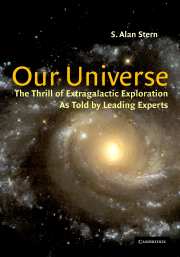Book contents
- Frontmatter
- Contents
- Preface
- The frontier Universe: At the edge of the night
- Part I Revealing a Universe
- Part II Denizens of the deep
- 5 The search for very massive black holes
- 6 Gamma-ray bursts—the most spectacular fireworks
- 7 Clusters of galaxies and the fate of the Universe (Or how to be a cosmologist without really trying)
- 8 Dark matter and the discovery of galactic halos
- 9 Hunting the elusive invisible galaxy
- Plate section
9 - Hunting the elusive invisible galaxy
Published online by Cambridge University Press: 03 September 2009
- Frontmatter
- Contents
- Preface
- The frontier Universe: At the edge of the night
- Part I Revealing a Universe
- Part II Denizens of the deep
- 5 The search for very massive black holes
- 6 Gamma-ray bursts—the most spectacular fireworks
- 7 Clusters of galaxies and the fate of the Universe (Or how to be a cosmologist without really trying)
- 8 Dark matter and the discovery of galactic halos
- 9 Hunting the elusive invisible galaxy
- Plate section
Summary
Greg Bothun is a northwesterner, educated in Washington State, briefly a professor at the University of Michigan, and now a long-time professor of astronomy at the University of Oregon. Greg, nicknamed “Dr. Dark Matter” by his friends, is interested (when not raising his two sons, hiking, playing softball, or golfing) in galaxy evolution and studies of large-scale structure in the Universe. In what follows Greg takes us on a very special journey that he traveled, to find the dim, lurking giants of galactica, the so-called low surface brightness galaxies.
Introduction
One of the assumptions in cosmology is that, no matter where you go in the Universe, the stuff you see when you get there is the same stuff that you already knew about. This is known as the Cosmological Principle. This principle asserts that the Universe, at any given epoch in its history, is homogeneous. Thus all observers should measure the same characteristics and same physical laws, independent of their exact location in the Universe. If this were not the case, then the Universe would be an arbitrary place and there would be no guarantee that, for instance, the law of gravity that holds in New Jersey would be the same as that which holds in California.
Much of observational astronomy is about detecting and classifying the stuff that is out there. For the first 50 years of this century, that task was devoted to stars.
- Type
- Chapter
- Information
- Our UniverseThe Thrill of Extragalactic Exploration, pp. 135 - 152Publisher: Cambridge University PressPrint publication year: 2001



